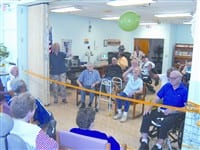What A Difference A Day Makes ADH Centers Offer A Wide Array Of Services — And Some Peace Of Mind
As adults enter the later stages of life, many will face significant health challenges that affect the quality of life for them and their families. From mental degeneration due to illnesses like Alzheimer’s disease or lack of mobility due to myriad health issues, coping with significant change isn’t easy for the adult or the family caring for their loved one.
Adult day health centers are there to help older adults and their families deal with these challenges. Located throughout Western Mass., ADH centers are a valuable resource with much offer.
“Our philosophy has always been about how we can help keep these folks in the community,” said Beth Hewson, program director for Hawthorn Services, which has several area facilities.
Significantly less expensive than a nursing home, and in many instances more effective in maintaining or improving the quality of life of seniors, ADH is an opportunity for older adults to get engaged and stimulated while having their physical needs monitored and met.
A Dedicated Team
Most ADH centers throughout Western Mass. offer transportation, making travel to and from the center convenient. Each center also employs an activity director, a registered nurse, a licensed practical nurse, a social worker, and certified nurse assistants. While at the center, these certified medical professionals make sure everyone is taking their medication, having their wounds dressed, if necessary, and eating their meals.
In addition to basic medical and hygiene needs, clients are engaged in group activities such as games and crafts. And some centers take their clients on field trips to restaurants, the movies, and the mall.
While all of the centers are consistent with regard to how they are structured and staffed, there is some variation in how each runs their programs. For example, Hawthorn Services, with centers located in Chicopee, Springfield and West Springfield, owns its transportation, so it has more flexibility with how they can use it. The company may offer multiple field trips throughout the day.
The bottom line, though, is that ADH ensures its clients are engaged and stimulated.
“Whenever I do an assessment (prior to attending ADH) and ask ‘what is their daily routine now?’ the response is usually they sit and watch TV,” said Jean Lajoie, the director of the Holyoke Geriatric Authority ADH. “But here, there’s activity, they socialize, they get a good meal.”
Take a Deep Breath
What’s more, ADH also is a great opportunity for caregivers to take a break and let the staff care for the needs of their loved one.
“Some of our clients are here as a respite for their families,” said Lajoie. “Say your spouse has Alzheimer’s and you’re both in your ‘80s. An Alzheimer’s client you pretty much need to watch all of the time. The caregiver needs a break.”
They can get their break any day or on multiple days, Monday through Friday, generally from 7 a.m. to 4 p.m. Some clients participate in ADH five days a week, but most are there two or three days a week.
Cost is reasonable and is usually covered by Medicare, if the client qualifies. To be eligible, a person must demonstrate a need with daily living, such as eating, showering, moving around, or using the toilet. Reimbursement rates are around $43 per day for basic services. Some long-term health care policies include coverage for ADH, and paying out-of-pocket is accepted.
According to Lajoie, most people don’t realize that clients get eight hours of nursing care at ADH for what it would cost to bring a nurse to their home for one hour.
While clients must meet certain criteria for Medicare reimbursement, Hewson says people shouldn’t assume they aren’t eligible for some type of service and should call the program anyway.
She said whether an older adult participates one day a week or five, there are benefits from the socialization and stimulation. And there’s the benefit of peace of mind in knowing dedicated medical personnel are running the operation.
“People often don’t know what’s available,” said Hewson. “There may be some other way they could get some services, but they don’t know the system. That’s why there may be an advantage to call.”
To learn more about eligibility and the benefits of ADH, contact a program (see sidebar) or look in Aging Services Access Points under Senior Agencies
in the Senior Resources section of www.MassResources.org.


Comments are closed.